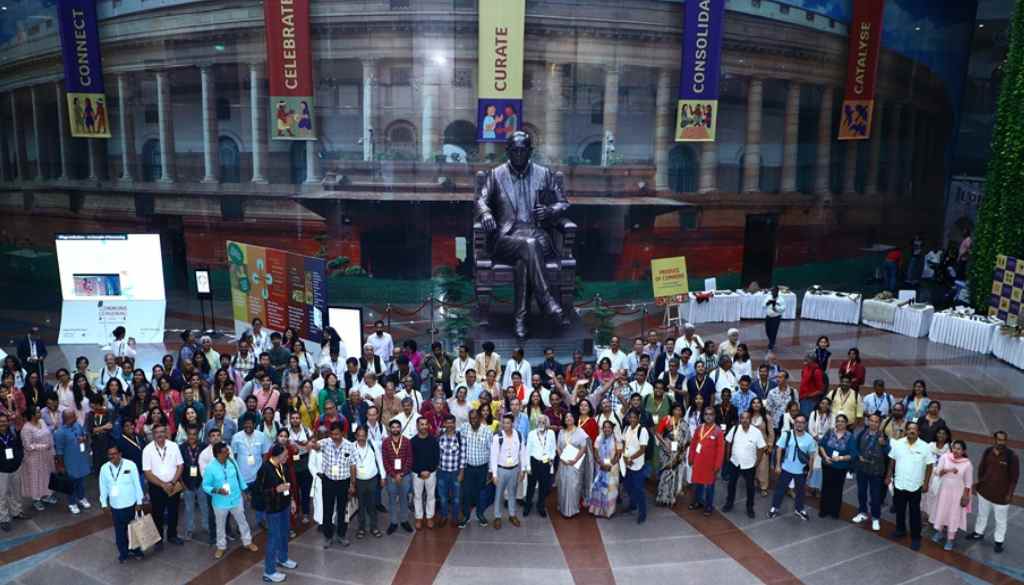Participants from Over 20 Indian States to Embark on New Pathways for Commons Conservation and Governance

New Delhi, 31st August 2024: Over 500 participants across 20+ Indian states convened to initiate concerted efforts towards the conservation and governance of the Commons at the Commons Convening, held at the Dr. Ambedkar International Centre (DAIC) from 27 to 29 August 2024.
The Convening brought together diverse stakeholders, including community leaders, policymakers, academia, civil society organisations, businesses, technologists, and media professionals to chart new pathways for safeguarding shared resources across India.
In India, 205 million acres, roughly a quarter of the landmass, constitute Commons comprising of community forests, pastures, and water bodies. The Commons supports over 350 million rural people and provides ecosystem services valued at over USD 90.5 billion (approximately Rs 6.6 lakh crore) annually. Unfortunately, these resources are rapidly degrading at a rate of 4% per year.
The Commons Convening put the spotlight on the significance of Commons, inspiring collective action by connecting Commons management to broader issues such as local self-governance, decentralisation, and the rural-urban continuum. As we face the twin crises of climate change and widening social gaps, it was recognised that Commons can serve as the platform for ecological restoration, resilient livelihoods, and social justice. Across 37 curated sessions, participants explored the critical role of Commons in food systems, rural incomes, freshwater ecosystems, and biodiversity conservation. The Convening served as a dynamic platform for dialogue and collaboration, enabling stakeholders to connect, share insights, and coordinate initiatives aimed at addressing systemic challenges and driving impactful, scalable solutions for India’s Commons.
Key Takeaways and Pathways
Throughout the Convening, among several priorities, the following emerged as focal points for future action:
1. Systems-wide Dialogue: Amplifying the role of the Commons in achieving the 2030 Agenda for Sustainable Development Goals as participants highlighted the interconnection between Commons and goals such as poverty reduction, gender equality, climate action, and partnerships.
2. Collaboration across Sectors: Recognising that Commons transcend political and administrative boundaries, the need for permeable, cross-sectoral collaborations is the need of the hour to drive effective governance and community-led action.
3. Institutional Strengthening: We need to embrace Commons as a governance paradigm for collective responsibility, shared decision-making, and equitable resource management. Strengthening local institutions and creating convergence between community (Samaaj), government (Sarkaar), and markets (Bazaar) were identified as critical for enhancing the governance of Commons.
4. Women’s Agency: Elevating the role of women as custodians of traditional knowledge was stressed, aiming to increase public space for women’s voices and challenge gender stereotypes in the management of Commons.
5. Climate Adaptation and Resilience: Encouraging community-driven, innovative financing mechanisms to build resilient Commons and address climate change. Moving forward Participants at the Convening stressed the importance of evolving the discourse on Commons, enhancing youth engagement, leveraging data and technology responsibly, and building research partnerships to inform policy and strengthen community action. Many advocated for amplifying narratives that connect Commons to broader human and planetary health while recognising and respecting community-led knowledge and stewardship.
A Rich Exchange
Co-organised by a dedicated coalition of partners – Common Ground, Foundation for Ecological Security (FES), Landstack, Tata Institute of Social Sciences (TISS), Mumbai, United Nations Development Programme (UNDP) India, and design partner Collaborating for Resilience (CoRe) — the Convening encouraged a vibrant cultural exchange, celebrating Commons champions and creating spaces for structured and open dialogue. The event provided a platform for participants to connect across sectors, share insights, and forge new partnerships across themes such as area-based planning, community-led governance of Commons, women’s leadership, coastal Commons management, and climate financing.
Catalysing Collective Efforts for Commons Conservation
The Convening concluded with a call urging participants to continue building on the connections and collaborations initiated over three days. As the Convening closed, it marked the beginning of a renewed commitment to safeguard Commons across India. The energy and ideas generated paved the way for the next steps in the collective journey to protect these essential shared resources.








